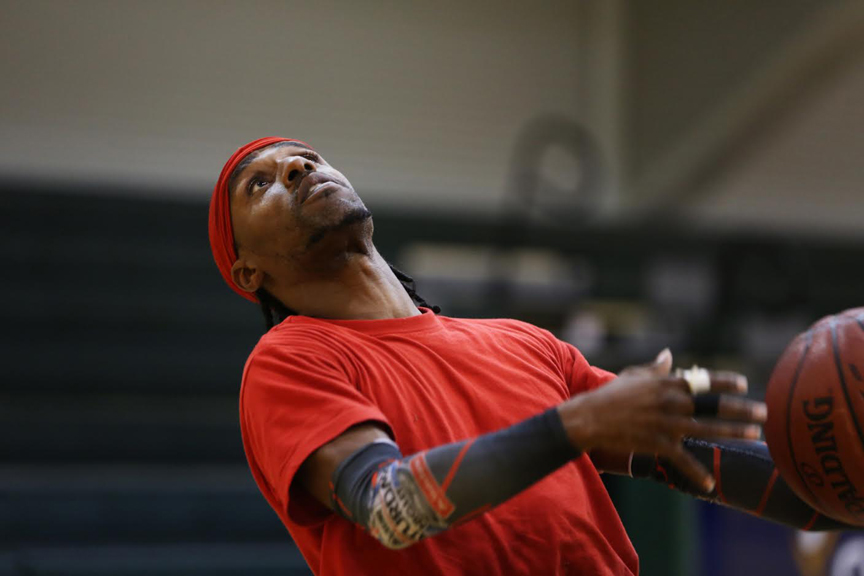
Point guard Joe Henry cuts through the lane. (Photo by Ian Cook)
As a teenager, Joseph Henry needed to get somewhere, but he hadn’t taken a driving class. He’d never seen another wheelchair user drive a car with adaptive technology. He didn’t see obvious solutions or clear limitations, but he did spy a broomstick in the yard. He broke it in half, and used it to push the gas and brake pedals on a borrowed car.
Almost three decades later, both the technology and his access to it have dramatically transformed. He now uses universal hand controls that switch out from his own car to a rental, as needed. Henry says people with disabilities can do anything they want today.
“If you’re young in the chair, fresh in the chair, there are a lot of things you can do to motivate yourself in life right now,” he says. But although there are special sports chairs, with wheels sloped outward to allow turning on a dime, no amount of technology will make a bad ball player good.
So as Henry trains for his fifth Wheelchair NBA All-Star Game in as many years, he readies himself the old-fashioned way — lifting weights, shooting baskets and running the ball down the court. He’s got until February to prepare. Meanwhile, the tournament, at Tulane University from 9 AM – 5:30 PM Saturday and 9 AM – 1 PM Sunday, will test the New Orleans Rollin Pelicans as a whole, as well as the crazy on-court speed their star player is known for.
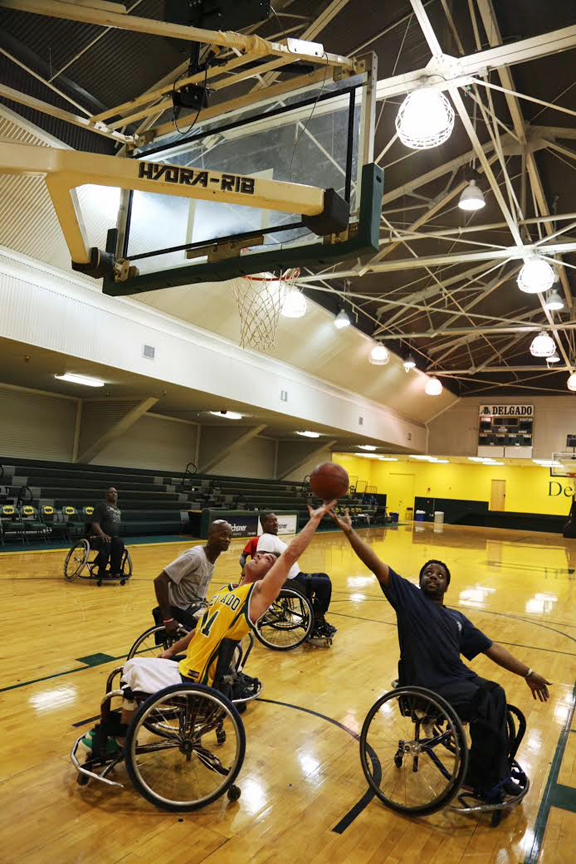
Left, Stephen Carrier, and right, Jeremy Butler (both guards), battle for the rebound. (Photo by Ian Cook)
Keep the Ball Moving
Rollin Pelicans Coach Dale VanCourt says he keeps nominating Henry to the All-Star team because of the leadership he provides as team captain and point guard, in addition to his outstanding commitment and natural talent.
“He’s got a crossover dribble like somebody who’s walking,” says VanCourt, who’s not only been the volunteer coach since Hurricane Katrina, but also serves as the Gulf Coast Commissioner for the NWBA and the Rollin Pelicans’ defense center. “He’s really good.”
Henry moves quickly around the court, and he’s quick to shoot. The very presence of wheelchairs makes it easier for a would-be shooter to get locked in by the defense, vulnerable to a three-second violation and a turnover. Metal crashes against metal. It’s just one of the many scenarios where Henry’s speed gives him an edge.
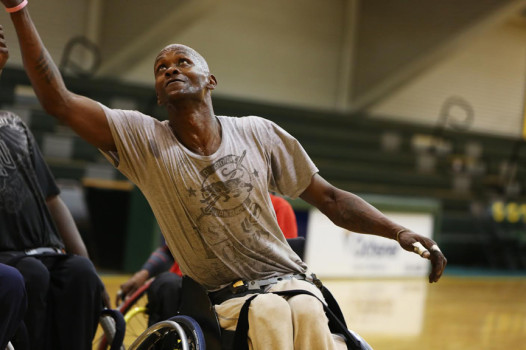
Wellington Ratcliff (forward) angles for a layup. (Photo by Ian Cook)
According to the all-star himself, these qualities were born, in part, because he never really identified with his limitations. He was only 12 when he was shot on Mardi Gras evening, while riding a bike to get his grandmother a snack. He was paralyzed instantly. But his desire to do everything a kid wants to do ensured he’d be active throughout the long journey that followed.
“It wasn’t really much but just wanting to get somewhere, wanting to go play basketball, everything like I wasn’t in a wheelchair,” he says. Joseph grew up in the Carrollton/Riverbend area, constantly surrounded by cousins. The family support was convenient at times, but, mostly, he resisted help. A broomstick wasn’t just for driving — it was for knocking boxes of cereal off the top of the refrigerator. Sharing the house with a teenaged Henry meant accepting the occasional crash from the kitchen.
“I just wanted to know if I could do it,” he says. “I never looked at it as ‘I don’t want you to help me.’”
Now at 45, he’s still showing himself. He’ll lead the team, which has several injured players, into this Saturday’s all-day tournament. The event is exciting in and of itself, but it’s also a great preview for the All-Star game. This year, both events take place in New Orleans.
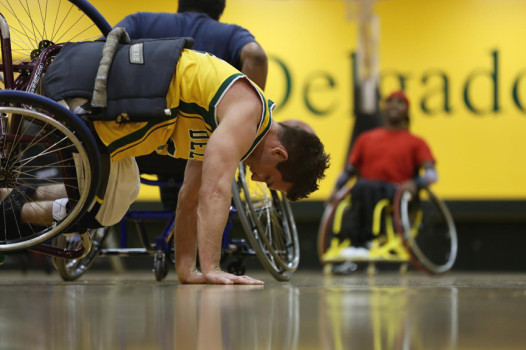
Carrier rights his chair after a collision. (Photo by Ian Cook)
Put On a Good Show
The Mardi Gras crime in 1982 didn’t dampen Henry’s taste for New Orleans-style celebrations. Over ten years later, he would go to the second lines every Sunday with his uncle and have a blast, but he noticed that nobody was representing Pensiontown.
So in 1994, he started a social aid and pleasure club for his neighborhood. Today, the Pigeontown Steppers put on what Joseph describes as “a family-oriented second line on Easter Sunday.” The club’s name came from Henry and his young friends’ spin on their neighborhood’s name.
“We mistook the name for Pigeon,” he said. “We didn’t know anything about pensions.” The club marches in bright Easter egg-colored suits and custom-made Italian alligator shoes. Year by year, it’s grown into the institution it is today.
“It’s another team thing, but we look at it as a competition because you work at being dressed the neatest and putting on a better show.”
Teamwork and competition aren’t the only things that second lining and playing ball have in common for Henry. 1994 was the same year that Henry played his first full season on the local NWBA team. Looking back on his early days of playing, he says the main reason it clicked was because he had already started to build up the upper-body strength necessary to compete.
“I was already an active person,” he says. When he was younger, he did a lot of wheelchair racing and weight lifting, activities that laid the foundation for the talent he exhibits on the court today.
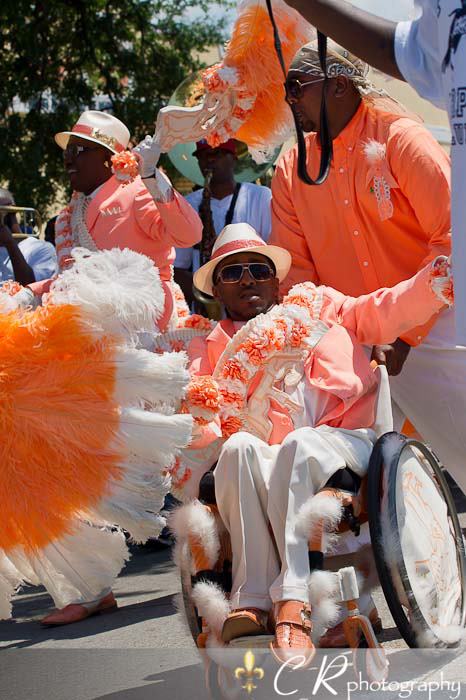
Henry second lines with the Pigeontown Steppers. (Republished with permission from CR Photography)
Orchestrate the Offense
The first time Joseph went to the All-Star game, he was blown away. Suddenly, he wasn’t the best he knew. It was so much fun, and he spent the whole time feeling star-struck — fortunate just to be sharing the court with such talent. After four years, he’s moved past that stage.
“Now I do what I have to do to be competitive with these guys,” he says. The NWBA plays by college basketball rules, with two 20-minute halves and three seconds allowed in the lane. They traverse the full length of the polished wood court quickly and repeatedly, with occasional violent clashes inside the three-point arc.
Fouls can result from rolling too hard into another player, but sometimes so much momentum builds up while chasing the ball that there’s no way to stop. As captain and point guard, Henry has to strike a delicate balance between emphasizing the rules of fair play and being aggressive enough to win.
“You really control the ball on the court,” he says of his position. “You orchestrate the offense, and I guess that’s what led me to be the captain on the team.”
To join the Rolling Pelicans as a player or sponsor, email Coach Dale VanCourt at rolndv@yahoo.com. Entry to this weekend’s tournament is free, so come out and support our boys!
Molly Kramer writes about New Orleans for NolaVie. Cinematographer Ian Cook, a recent transplant to New Orleans from D.C., runs Hard Road Pictures.
 NOLAbeings
Multimedia artist Claire Bangser created NOLAbeings as a portrait-based story project that marries...
NOLAbeings
Multimedia artist Claire Bangser created NOLAbeings as a portrait-based story project that marries...
 Data corner: Adobe Suite (create a PDF, social media graphic, presentation, edit a photo and video
Data corner is where you go to work with analytics and top tech skills. It takes on everything from PERL and SQL to Canva and Sprout Social.
Data corner: Adobe Suite (create a PDF, social media graphic, presentation, edit a photo and video
Data corner is where you go to work with analytics and top tech skills. It takes on everything from PERL and SQL to Canva and Sprout Social.
